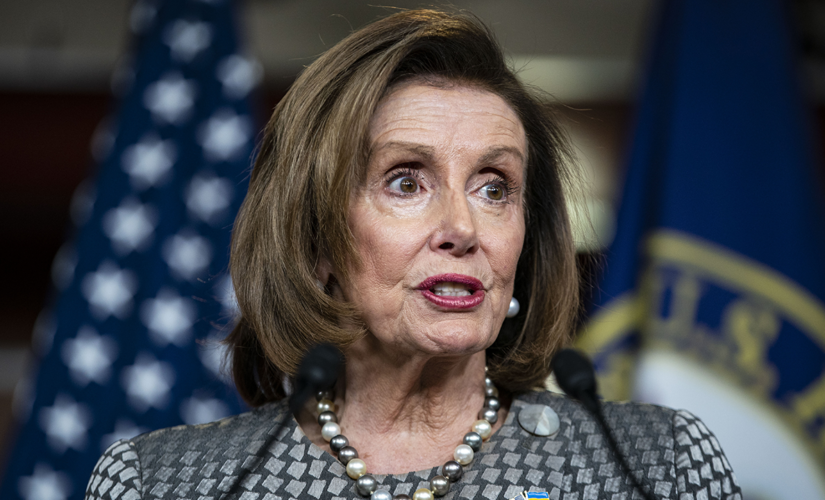House Speaker Nancy Pelosi on Thursday would not commit to bringing up on the House floor a newly passed Senate bill that would ban Chinese-owned video-sharing app TikTok on government devices.
The bill, sponsored by Republican Sens. Josh Hawley, R-Mo., Tom Cotton, R-Ark., Rick Scott, R-Fla., and Marco Rubio, R-Fla., unanimously passed the Senate Wednesday.
SENATE PASSES BILL THAT WOULD BAN TIKTOK ON GOVERNMENT DEVICES
The legislation would ban the video-sharing app on government devices after major security concerns were raised by both Democrat and Republican lawmakers and Biden administration officials.
House Speaker Nancy Pelosi speaks at a press conference.
(Getty Images)
When asked Thursday whether the House would consider the legislation before the end of the session, Pelosi, D-Calif., said she is reviewing the legislation and checking with the White House on the language.
“I’ll take a look and see,” Pelosi said. “I don’t know if that will be on the agenda next week, but let’s see.”
The legislation comes amid warnings from Biden administration officials about the app.
Treasury Secretary Janet Yellen has warned that there are “legitimate national security concerns” with regard to TikTok.
And FBI Director Christopher Wray earlier this month warned that Chinese officials have broad access to TikTok, allowing them “to manipulate content, and if they want to, to use it for influence operations.”
TIKTOK POSES ‘LEGITIMATE NATIONAL SECURITY CONCERNS’: TREASURY SECRETARY YELLEN
“All of these things are in the hands of a government that doesn’t share our values, and that has a mission that’s very much at odds with what’s in the best interests of the United States. That should concern us,” Wray said.
Wray has said he is “extremely concerned” about the threats posed by the app, explaining that the Chinese government can use it to “control data collection on millions of users,” and then have the “opportunity to potentially technically compromise personal devices” of Americans.
FBI Director Christopher Wray is raising national security concerns about TikTok, warning Friday that control of the popular video sharing app is in the hands of a Chinese government “that doesn’t share our values.”
(AP Photo/Carlos Osorio)
TikTok’s Chief Operating Officer Vanessa Pappas said the company won’t share data and that users’ data is protected, during a September Senate hearing.
“We will never share data, period,” Pappas said.
But TikTok is owned by ByteDance, a company based in Beijing.
U.S. officials and lawmakers have warned that the Chinese Communist Party could compel the company to turn over American users’ data or expose them to propaganda.
Republicans and Democrats have warned about the potential dangers of using TikTok. (Getty Images)
(Brent Lewin/Bloomberg via Getty Images)
TikTok and ByteDance are currently under investigation by the Treasury Department’s Committee on Foreign Investment in the U.S. (CFIUS), which evaluates national security risks associated with foreign-owned companies operating in the U.S. or foreign investments in American companies.
While Biden administration officials and lawmakers are issuing stark warnings about TikTok, former Secretary of State Mike Pompeo began sounding the alarm on the video-sharing app in 2020.
The Trump administration proposed a ban on TikTok over concerns that the app exposed Americans to having their personal information sent straight to the Chinese government.
CLICK HERE TO GET THE FOX NEWS APP
Pompeo, a Fox News contributor, said earlier this month the government “100%” should ban TikTok, calling it “a powerful tool with deeply embedded AI” and warning that it is “an element of the Chinese security apparatus.”
As for China, top intelligence community officials continue to warn that China poses the “biggest long-term threat” to U.S. economic and national security.




